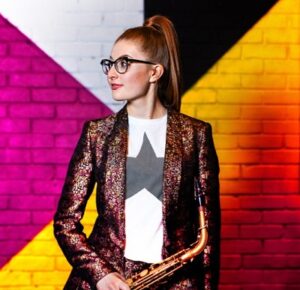Simon Hale spends an enjoyable evening with the CBSO.
What better way to spend a miserable winter’s evening than sitting down in a great concert hall auditorium and listening to fairy tales?
The CBSO, led by the returning Brazilian conductor Eduardo Strausser, offered just such an opportunity with a Symphony Hall programme that took the audience into a world of fantasy and enchantment. But it was young saxophone virtuosa Jess Gillam, making her appearance on stage in a slinky black lace top with shiny red, black and silver trousers and sparkly shoes, who was the star attraction.
With her soprano sax, Gillam revelled in the rhythmic melodies in Heitor Villa-Lobos’s Fantasia for Saxophone, enjoying conversations with the orchestra from the dance-like to soulful Brazilian saudade. She shifted to an alto sax for a fantasy based on fact in John Williams’ Escapades – known instantly by film buffs as the soundtrack to Steven Spielberg’s crime caper Catch Me if You Can.

The adventures of Frank Abagnale in passing himself off as a sharp-suited commercial airline pilot and in other professional guises were brought to life in the 15-minute piece – with Gillam brilliantly conveying all the humour, energy and tension in the protagonist’s exploits.
Gillam’s scintillating playing was matched by a close vibraphone and double bass accompaniment that at times turned the music into an exciting dialogue between three instruments and the orchestra.
The fairy tales included the Overture to Gioacchino Rossini’s comic opera La Cenerentola, based on a version of Cinderella without the glass slipper and fairy godmother, and the Suite from The Golden Cockerel opera by Nikolai Rimsky-Korsakov about a cockerel that a paranoid tsar believes will save him from imagined enemies, both colourfully retold by the CBSO in lush orchestration.
Rimsky-Korsakov was the composer Serge Diaghilev had in mind to compose a new ballet for the Ballets Russes, but his untimely death gave his pupil Igor Stravinsky the opportunity to produce The Firebird, which he based on a Russian folk story.
Owing a lot to Rimsky-Korsakov in its melodies, the piece was revolutionary in its use of harmonic glissandos in the string introduction and asymmetrical phrasing in its Infernal Dance, which was played by the CBSO with great clarity.
The brass and percussion strong finale to the Firebird story, in which a mythical bird helps a prince defeat an ogre and release thirteen princesses from slavery. provided a thrilling ending to a truly fantastic evening.
The CBSO returns to Symphony Hall on Wednesday, February 14th at 7.30pm for a Valentine’s Day Concert of music by Tchaikovsky and Beethoven. The programme includes Tchaikovsky’s Romeo and Juliet Fantasy Overture and the Letter Scene from Eugene Onegin, and Beethoven’s Ah, Perfido and Symphony No 2: cbso.co.uk.


